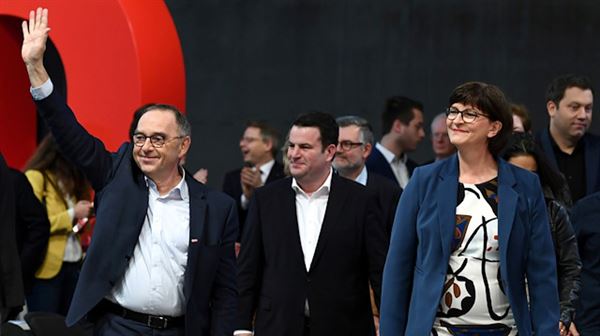Support for Germany's Social Democrats (SPD) has fallen after members last week chose as leaders a leftist duo who are sceptical about remaining in g
Support for Germany’s Social Democrats (SPD) has fallen after members last week chose as leaders a leftist duo who are sceptical about remaining in government with Chancellor Angela Merkel’s conservatives, a poll showed on Saturday.
At a party conference on Friday, the SPD gave their new leaders, Saskia Esken and Norbert Walter-Borjans, a mandate to talk to Merkel’s conservatives about continuing in government and set out some relatively modest policy demands.
The party is struggling to recover after weak regional and European election results and a six-month leadership campaign. Many members want to quit government – a move that could trigger a snap election or minority government.
A Forsa poll put the SPD on 11%, 3 points down from a week ago and hitting a low last seen in June after previous leader Andrea Nahles quit due following the party’s worst-ever result in elections to the European Parliament.
The poll put Merkel’s conservatives up 1 point at 28% and the far-right Alternative for Germany (AfD) also up 1 point at 14%.
“Contrary to what the SPD hoped, the long search for a leader has not turned out to be a high point for democracy but rather a big let down,” said Forsa chief Manfred Guellner.
“Voters are fed up with SPD being obsessed with itself – they want it to rule,” he told Reuters.
The SPD’s new leaders have expressed doubt about the future of the coalition but are prepared to give it a chance if the conservatives accept their demands.
Those include a boost in investment in infrastructure, introducing tougher climate protection measures and increasing the minimum wage – a more modest package than some on the SPD’s left had wanted.
The conservatives have said they will not renegotiate the 2018 coalition deal but made are open to some new ideas.
Guellner said the SPD’s approach was not sufficient to win over voters already lured by the Greens, on 22% in the Forsa poll, up from 8.9% in the 2017 federal vote.
